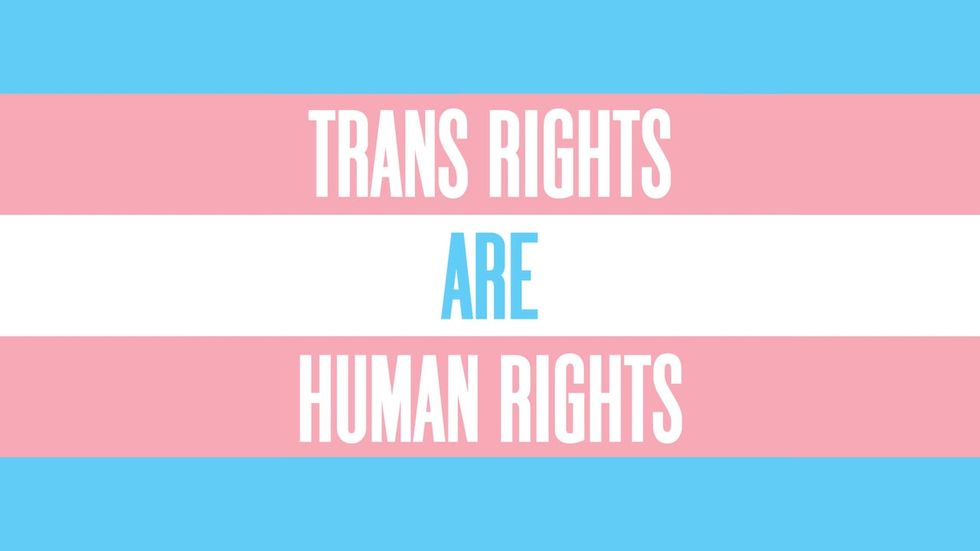The uptick in common knowledge pertaining to the transgender community over the past several years has been incredible. Many basic components of trans allyship--asking for pronouns, rejecting slurs, avoiding the conflation of gender and sexuality--are becoming more and more well known, and that’s wonderful! However, there are some subtler harmful behaviors in which cis people often unknowingly engage. It isn’t hard to avoid these things, or to take a few extra steps to ensure that your trans friends and family members feel as comfortable and safe around you as possible.
1. DON’T automatically apply gender to someone’s aesthetic expression.
Yes, gender expression is absolutely a thing. However, trans people are often aware more than anyone that clothing, makeup, and hair length are not inherently gendered--and they may like to play around with these things! As a trans masculine person, I often have a lot of fun messing with extravagant makeup, skirts, and wigs. This doesn’t mean that I’m not experiencing dysphoria, or that I want to be read as “girly” or female. I’m as much of a guy as ever--just a more flamboyant one!
I know that this can be confusing, but trust me--we know our own comfort levels better than anyone else. Unless we say otherwise (as some genderfluid people may!), stick to the pronouns we last asked you to use, whether or not you think they match our current gender expression. And please, please don’t comment on how we “make a good [boy/girl/assigned gender].” I promise we don’t want to hear that.
2. If a person isn’t publicly out as transgender, DO ask what’s safe before entering a social situation with them.
Just because someone has come out to you personally doesn’t mean that they’ve done so with everyone else. A lot of trans people need to remain largely closeted, and with the way social media enables us to express different personas, it’s becoming more and more possible for people to live double lives, so to speak. You may know someone as a confident trans person, but it’s still possible that they cannot safely come out to certain friends, family, or coworkers. So, if someone isn’t publicly out of the closet, check beforehand--they may want you to refer to them with a different name and pronoun set around certain people than you would in private. This doesn’t mean that they’re faking anything--just that they’re staying safe!
3. DON’T refer to a trans person with the wrong pronouns, even in the past tense.
This is pretty simple. “When he used to be a she….” “They--well, he back then….” ...And so on. It’s unnecessary, and more hurtful than you realize. The person in question may or may not consider themself to have actually changed gender over the course of their lifetime; oftentimes, trans people feel that they’ve had a static gender their whole lives, just not one that they fully understood at an earlier age. It’s very rarely a matter of “used to be.
4. If it’s safe to do so, DO correct someone if they misgender your trans friend.
As mentioned in #2, it isn’t always safe for a trans person to be out of the closet. However, if you know that they are out to someone you’re speaking to, and if that someone misgenders them, this is your chance to speak up! People often have an unfortunate habit of misgendering trans people behind their backs. You can do your part to remind them that correct pronoun use isn’t something that becomes unnecessary when the person in question is out of the room.
And even if the trans person themself is present during this conversation, there’s no reason not to speak up! It isn’t always easy for us to correct someone who misgenders us--in fact, it’s often extremely anxiety-inducing. By correcting someone yourself rather than waiting for us to do so, you’re taking a huge weight off our shoulders!
5. DON’T give unsolicited passing advice.
Sometimes, binary trans people will ask cis people of their gender for advice on how to appear more masculine/feminine--for example, a trans woman might ask a cis woman for feminizing makeup tips. However, that doesn’t mean that all of us want your advice. Telling us that dressing a certain way or cutting our hair differently would make us look “more like a boy/girl” really isn’t helpful. I can promise that we’ve thought about this a lot more than you have; our appearances may be a matter of safety, comfort, and/or aesthetic preference. If we want your advice, we’ll ask for it. Otherwise, all you’re doing is telling us that you personally don’t read us as our correct gender, and that hurts.
6. DO try to use neutral pronouns for people you whose gender you don’t know.
It’s a little thing, but it makes a big difference. Buckle down and use “they/them/theirs” pronouns if you’re unsure about someone’s gender, rather than weaving uncomfortably between “he” and “she.” It’s safe, it’s easy, and it’s grammatically correct: historical proponents of the singular “they” include Austen, Shakespeare, Chaucer, and Shaw.
7. DON’T remind people how “hard” it is for you to adjust to gendering them correctly.
We believe you. But you’re making us feel guilty for being our authentic selves with you, and that’s all kinds of messed up.
8. DO offer to accompany your trans friends to the bathroom!
This is an easy way to express allyship and make a big difference in our lives! If you’re a cis woman and your trans feminine friend wants to use the ladies’ room, offer to go with her! (The same, naturally, goes for cis men and trans masc folks.) The experience of navigating public restrooms as a trans person can be awkward at best, and downright dangerous at worst. Having an ally with you is more than a comfort--it can actually be crucial if things start to look like they could get messy.
Now go forth and show your trans friends some extra support! We love you!

















